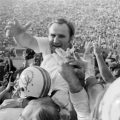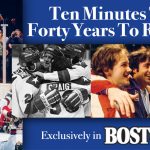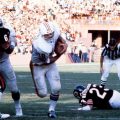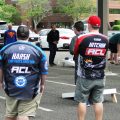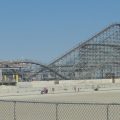Tag Archives: neil peart drum solo

Neil Peart 1952-2020: Tribute to The G.O.A.T. Rock Drummer

A thoughtfully considered Neil Peart tribute, from a devoted Rush fan.
I remember where I was when I heard John Lennon was murdered. I remember where I was when I heard that planes had crashed into the World Trade Center. And I remember where I was when I learned that one of my biggest musical heroes had passed away.
It was January 10, 2020. I was upstairs in my living room, playing with my kids on a weekend afternoon. At 4:28 PM, my phone chirped with a text from Greg Miller, a friend of mine since we were four years old…and a fellow Rush fan since we were in our teens.
“Dude!!??? Did I just read that right!!! Neil Peart is DEAD??”
Almost at the instant I read the text, the phone rang. It was Chris Salvatico, another longtime friend and another fan since high school, where I was well known for my beyond fanatical dedication to a rock band. He had heard the news on the radio, and of course I was the first person he thought of.
Suddenly this life’s journey was on the other side of my favorite band’s drummer still being alive. In that moment, any sliver of hope that we Rush fanatics clung to of seeing our musical heroes play on stage again, maybe just one more time, was gone.
2020 would have more than enough misery and heartbreak that people would be gladly wishing it away by the end of it. I suppose I should be grateful that losing Neil Peart and Eddie Van Halen, two musicians I never met, would be the toughest thing I would have to deal with on a personal level.
While both men passed from this earth prematurely, they were both here long enough to give us an outstanding catalog of music…blood-pumping soundtracks for our lives.

Already air drumming with the best at age five.
A New Generation of Neil Peart Fans
As I would do some months later following Eddie Van Halen’s passing, I filled a thumb drive with Rush music and played it in my car for several weeks. Soon my son, just four at the time, was taking to the music Dad was playing. He is now a big fan…watching Neil drum solos on YouTube constantly, frequently asking Dad to put Rush CDs in the stereo, even setting up a miniature kit of various toy drums that he bangs along with his favorite Rush videos. At five, Neil Peart is already his hero. No paternity test will ever be needed with this one.
At some point, his favorite songs have been “Caravan”, “The Main Monkey Business”, “YYZ”, “Crossroads”, “Tom Sawyer”, “Roll The Bones”, and “The Big Money”. He likes watching the live videos for “One Little Victory” and the “R30 Overture”, too.
So evidently, he isn’t partial to any particular era, unlike so many fans who think Rush was never as good as they were on Moving Pictures or 2112. Not only is he not bound by some imaginary noose of expectations for his favorite artist, at five, he doesn’t yet know that the music is too old to possibly be cool.
I remember going to Rush concerts in the 2000s, and seeing kids that were my age when I became a fan, wearing tees for albums that were released before they were born. In 2009, I went to a Mets game at Citi Field, and unexpectedly ran into an old friend from my bartending years. He was at the game with a young man who was sporting a Power Windows T-shirt. I marveled at this, and gleefully informed him that I had seen that show from the sixth row at the Philadelphia Spectrum. “I was like, 20 feet away from Alex!”
Rush may not be for everyone, but for the personality type that gets into their music, it is as timeless as any in this world.
There were, of course, other bands with iconic drummers whose fame long outlived their existence, or at least their peak years. Led Zeppelin and The Who, and The Beatles for that matter, all had unique stars behind the kit.
But the drums weren’t the main catalyst for launching any of them to mega-stardom. With Rush, it most definitely was. As great as Geddy and Alex were as musicians and songwriters, it was the drums more than anything else that propelled Rush to a level of cult fanaticism unequaled in rock music. The unusual beats, oddball time signatures, memorable fills, and the technical wizardry of the man behind the kit…more than anything else, Neil Peart’s drumming defined this already great band.
You need only to have attended a Rush concert and seen hundreds of arms flailing away at imaginary kits, often quite accurately along with the fills, to know that.
“Tom Sawyer”, Rush’s signature song, became a rock staple that still holds up today almost entirely because of the drums. Maybe that synthesizer riff in the middle is a pretty cool hook, but the tune wouldn’t have killed like it did without the drum fills following the guitar solo. Four decades after its release, no classic rock anthem inspires more completely shameless air drumming, often with no regard even for chicks in the room.
No drummer…no musician…inspired listeners to memorize passages like Neil Peart did. The beats and fills were always an integral, key element of Rush songs. You can pick 20 tunes from any era in the band’s history, and very often not hear the same fill twice.
Rock Music’s Greatest Drum Solo
It’s a challenge to think of any rock artist whose live show featured the drum solo as the highlight…especially for bands as established as Rush were. Sure, Phil Collins, Bill Bruford, Danny Seraphine and others could play entertaining and skillful solos, but one hardly considered them the pinnacle of their bands’ shows.
But the Neil Peart Drumming Showcase? Yes, for many in the audience, that was the apex of the evening. Only at Rush concerts could you feel the audience’s growing excitement that the drummer would soon be taking over the stage.
It wasn’t just the profoundly challenging technical skill, the limb independence, or the blinding speed, crossovers and waltz enhancements that were just as fun to watch as to listen to. A Neil Peart drum solo was literally a piece of music, especially in Rush’s later years when brass samples, an electronic marimba, and Buddy Rich Big Band horns all became a part of his 7-plus minute percussive masterpiece.
A Neil Peart drum solo could often be the clincher that turned one into a dedicated Rush addict. That certainly was the case with this young fan, who shortly after discovering this band had “YYZ” from the Exit…Stage Left LP…and its insanely fast solo…near the top of his most-played Rush cuts. When their third live set, A Show of Hands, was released, I happily bought it for just one reason: the drum solo and its new sound effect samples, which now had a name: “The Rhythm Method”.
As electronic drum technology evolved over the years, Neil’s solo did too, becoming even more musical, as the Professor added new elements to it with every tour. As a treat for the fans whose favorite part of a Rush show was the drum solo, Neil even released a video dissecting each part of his “Der Trommler” performance on Rush’s 30th Anniversary Tour, including how he both came up with each section and learned how to play it.
No drummer in rock music history commanded such stature when his bandmates left the stage, because no drummer in rock put the effort into his solo showcase that The Professor did. Like his approach to conjuring up challenging and suitable parts for Rush songs, or constructing words for Geddy to sing, Neil saw the drum solo as a craft, something that he believed should be as entertaining as it could possibly be.
I saw Chicago, Genesis, Yes, Van Halen, King Crimson, and a number of other acts that prominently featured a drum solo in the show. But no one at the Van Halen concert leaned over to me and said, “It’s Alex Time.” Everyone at Rush concerts anticipated Neil Time.
Rush had a devoted enough following that they could get away with leaving some very popular staples out of their set and still leave a crowd blown away. I’ve seen Rush shows that were missing “Freewill”, “Limelight”, “Subdivisions”, and “2112 Overture” from the setlist (to name a few), and the audience never seemed to mind.
But there would likely indeed be unrest, torn tickets, and declining T-shirt sales if a Rush audience were deprived of their drummer’s solo event.
A Rarely Equaled Rock Wordsmith, Too
Not many musical artists, certainly not in 1980s rock, were as dedicated about putting beautifully composed words in their songs. Neil Peart wrote so many verses full of thoughtful observations about life that I can’t think of, say, five favorites. It’s enough for me that, to this day, he’s given me the best answer I’ve heard to life’s most infernal question: Why are we here?
Peart covered a lot of topics in Rush lyrics…have you ever heard a rock song full of anagrams?…but pursuing one’s dreams was a major theme. Nearly the entire Roll The Bones record contemplates this, as does the entire first side of 2112. He could be encouraging about following one’s heart, as in “Middletown Dreams” or “The Analog Kid”, but he was realistic about the trappings of fame too, as in “Limelight” or “Superconductor”.
Ayn Rand’s capitalist views were a strong influence in the band’s early years, then he turned to science fiction fantasies. As the band became increasingly popular, Rush’s lyrics commented on the human condition less metaphorically, and sometimes went into darker places, especially around the Grace Under Pressure period.
You can see a clear change in Neil’s lyrical demeanor between Test For Echo and then Vapor Trails, which, as every Rush fan knows, were the two albums on either side of devastating personal tragedies in his life. Test For Echo is full of lyrics written by a man confident in his ability and in sharing his viewpoint about how to best live life. Following the loss of his daughter in a car accident and then his wife to cancer ten months later, the lyrics on Vapor Trails reveal a soul that had risen from the ashes, but was clearly forever scarred by the blows. The words in the title cut are particularly emotional and heartbreaking.
No doubt this patch of the journey affected his view of life in general very deeply, and it was bold of him to share a great deal of that with the world. It would be easy to understand anyone questioning a Benevolent Supreme Being, as he did quite effectively in songs like “The Stars Look Down”, but he also directed angst at faith in general and its practitioners. Or more correctly, its abusers.
As a practicing Catholic who grows weary of anti-Christian platitudes from wealthy performers, I admit to taking issue with some of it, especially several songs on the Snakes & Arrows album. But I’ve since come to realize that there is a lot of truth to what he wrote on that record, certainly so if one had a darker view of human existence as he understandably did. I am careful not to take the same viewpoint, but “Bravest Face” and “Good News First” are powerful examples.
Whatever the focus of Neil’s words, there was never any lack of precision or clarity, never any lack of a powerful statement contained within them. Whether you agreed with what he thought or not, he always made the point.
Like with Rush’s music, you very often didn’t get the words to a Rush song in one listen. A song like “Subdivisions” endures because there are so many ways it grabs the listener…the classic synthesizer riff, the soulful guitar solo, the epic drumming behind the verses and towards the end. In the same way, the words of that particular classic take every opportunity to move the listener too. Just as one grasps “in geometric order, an insulated border, in between the bright lights and the far unlit unknown”, they’re hit with “some will sell their dreams for small desires…or lose the race to rats, get caught in ticking traps, and start to dream of somewhere to relax their restless plight”.
I remember a radio show called “Rockline”, where fans could call in and ask their musical heroes questions. Shortly after the Power Windows album was released, Rockline featured Geddy Lee. The host, the late Bob Coburn, asked Geddy about what inspired Neil in writing the words, saying, “The lyrics on this record are unbelievable!”
Geddy responded with something that has resonated with me ever since. He said, “Neil works very hard at everything he does. It’s another thing he works hard at.” Power Windows, still probably my favorite Rush record, was a shining example…it contained songs about the corruption of people in power, the design of the atomic bomb, the demands of a lifetime striving for excellence, the nonsensical destruction caused by nation borders, and the risks of being outward with your emotions. Unheard of for a rock record, especially in the MTV-polluted 1980s.
Every Rush album was like that. A new Rush release always gave you a whole slew of subjects to ponder, and you were offered an initial way of thinking about these things from someone who’d carefully considered them. The words in Rush songs, to those outside of Rush fandom, are an extremely underappreciated facet of their music. Yes, they were definitely intellectual…if you thought Def Leppard or Van Halen wrote deep stuff, Rush probably wasn’t for you.
Sometime after Power Windows was released, Neil gave a terrific interview to Guitar For The Practicing Musician magazine, that I actually still have laying around. (I scanned it and it’s an excellent interview; you can read it here.) The amazing thing reading it, even today, is that here was arguably the most highly regarded rock drummer of his generation, giving an interview entirely about writing lyrics.
But for a Rush fan who loved the words too, it was a fascinating read. I learned so many things just reading that interview that have helped me as a writer. One thing he pointed out was that there were two things you couldn’t compromise: inspiration and craftsmanship.
He pointed out that, “When an inspiration comes to you, it doesn’t matter how inconvenient it is, you must take advantage of it at the time.” That is SO true…and I have probably missed opportunities to write best-selling books because I thought “Oh, I’ll remember that” about an idea that I would later be fuming over having forgotten.
He said that “craftsmanship speaks”, and that he could tell when the lyrics to a song were written in five minutes. Most of us could.
Rush fans got it. There was always something more in the words of a Rush song, another line, another verse, that you missed in the first listen and that knocked you over the head in the second. Just as their music contained little turns and riffs and drum fills that you didn’t catch the first time. The albums that grow on you are always the best ones, and every Rush album had that quality.
If you didn’t get it, as most critics didn’t, well, that was your loss. If you were willing to make the investment of giving a Rush album a few listens…which you likely had no choice but to do if you had a Rush fan friend…you soon would get it, and you’d be wowed as much by the words as the drums.
Was Neil Peart The Best Rock Drummer of All Time?
Like I did with Eddie Van Halen, I thought any Neil Peart tribute should answer the question of whether he really was the greatest rock drummer that ever lived. I find it hard to rank any drummer above Buddy Rich overall, but in the realm of rock music, Neil had few peers.
So I’ve produced this list of well-known rock drummers, with my comments on what I think made Neil a better one. I LOVE ALL OF THESE DRUMMERS…please do not think I am being critical of them. This is just here for your next music conversation with friends at the bar.
Keith Moon. It’s doubtful that The Who would have become the rock monsters that they became without the certified lunatic behind the drum kit. He had a style like no other and is always included in any discussion of rock’s greatest. Moon was also, as you can clearly tell listening to the Fly By Night album, a heavy influence on Peart himself.
However, I could say that Neil ultimately became a better overall drummer than Moon in his career. For one, he was more precise…John Entwistle once said Keith Moon was the hardest drummer in the world to play with; Geddy Lee never had any such complaint about Neil Peart. Neil could play with as much reckless abandon as Keith on a record…but Peart would memorize that reckless bit, and play it precisely on the stage.
John Bonham. I underestimated Bonham’s technical ability until I watched a video comparing him with Peart soloing…and definitely holding his own. Bonham was in fact an outstanding drummer technically, and he could play as fast and as precise as nearly anyone in his day.
If nothing else, though…and I remember debating a Led Zeppelin fan friend about this…Peart produced more songs that became rock staples because of the drums. “Tom Sawyer”, “2112”, and “Subdivisions” are great examples. Bonham had an unmistakable sound and was perfect for Led Zeppelin, and the drums are always great in Zeppelin songs. But he didn’t quite match the imagination and variation that Neil added to Rush records.
Bill Bruford. Bruford is a respected icon among prog drummers especially, and rightly so. He’s played with Yes, King Crimson, U.K., and Genesis…and he made them all better with his jazzy style. A common phrase I’ve read about Bruford is that he was “too rock for jazz and too jazz for rock”. Absolutely true, but when he got somewhere in the middle, he shone like few could.
Give Bruford props for moving from rock to fusion to jazz in his career and excelling at all of them. On several levels, though, I still think Neil was better, especially having seen them both live. Bruford sometimes duplicated the sound of the records live, sometimes not, and his solos in the seven shows I saw him were great. Peart duplicated the sound of the drums on Rush records nearly 100% of the time, and his solos were even better.
Phil Collins. In light of his mega-stardom as a singer and songwriter, it’s easy to dismiss how great a drummer Phil really was, even garnering lavish praise from Neil himself for his performance on the Selling England By The Pound record. Especially in the Peter Gabriel-led era of Genesis, Phil came up with some profoundly complex rhythms and skillfully executed them live. He may have lost the desire to produce that complexity in Genesis’s later years, but he was always a more skilled drummer than he was given credit for.
If I were to ultimately rank Neil as a better drummer, it might be on just on one level…the drum solo. Even playing a duet alongside Chester Thompson, Phil’s drum solos didn’t compare to the visual and aural spectacular that was “The Rhythm Method” or “O Baterista”. As I’ve said, Neil’s drum solo, unlike Phil’s (or any drummer’s, for that matter), was a highlight of a Rush show…and that was no small feat to pull off. I can’t say that about Genesis shows.
Ginger Baker. I had a musician friend once tell me that he thought Baker could have been a really great drummer if he chose to practice more, which I thought was humorous. I might believe it given the overall sloppiness of his playing…although I do enjoy listening to Cream’s better stuff for that reason.
It’s just my opinion, but Ginger doesn’t ultimately hold up as one of the greats alongside Neil. He was a cool rock icon and could play interesting bits really well, but he ultimately didn’t quite establish himself as a rock drumming giant in the way Moon, Bonham or Peart did.
Alex Van Halen. Alex had a good rock sound and could play fast, but he wasn’t in Neil’s league as far as skill, imagination or creating a worthwhile solo. He happened to have a brother in his band who was an enormously talented guitar player and songwriter, and he played up to his own abilities and let his brother lead the way. He was fine for Van Halen, but not one of the all-time greats on a kit.
Danny Seraphine. It’s hard to top Chicago’s “Introduction” as one of the greatest drumming performances in rock history. Danny brought a jazz style to rock music, and he made it kick ass like no drummer could, not even Bill Bruford. In a band full of world class musicians, Seraphine was unquestionably a key cog in the machine.
Seraphine had great technical skill and could play very fast, and the drums in Chicago’s Terry Kath era songs especially always sounded great. But he didn’t have quite the imagination…nor the technical prowess, I would add…that Neil had behind a kit. Seraphine provided great backing, but he couldn’t have come up with something as varied and imaginative as “Subdivisions”.
And just for the record, Neil never got kicked out of his band for not practicing. (OK, maybe that one isn’t fair…)
Tim Alexander. Herb can play faster and better technically than all but a small handful of drummers…he may be the most technically skilled drummer I’ve heard, and that’s saying a lot. But Primus is a decidedly inferior band to Rush on a songwriting level, and to this point there aren’t any Primus songs I can think of that are great because of the drums. I might put “John The Fisherman” on that list, but not many others.
Alexander might top Peart on technical skill by a small margin; he’s not even close on imagination.
Mike Portnoy. Every time I hear someone suggest that Geddy and Alex hit the stage with Mike Portnoy on the drums, I cringe. At every Rush show I attended, Neil was the star of the show. I’m sure Portnoy could play any Rush song as precisely as fans would expect, but would he mimic Neil’s solo too? Or would he come up with his own? Either would be too painful to watch.
Like Tim Alexander, Portnoy is astoundingly skilled and he’s a cool guy. But he doesn’t have the compositional drumming skill that was the signature of Rush’s best music.
Ringo Starr. Someone once asked John Lennon if Ringo was the best drummer in the world, and Lennon replied, “He’s not even the best drummer in the Beatles.”
That might be true, but Ringo was brilliant in his own way, providing simple backing to arguably music’s greatest act. His one known solo, a short bit on the Abbey Road album, was minimally perfect for the song. Ringo never overplayed, making him perfect behind the tremendous songwriting talent in front of him.
Both Rush and The Beatles became huge after replacing their original drummer, but it’s possible the Beatles could have thrived with someone else on the kit. Not likely maybe, but possible. I doubt one could say that Rush would have become the iconic cult band they became with any other drummer.
Carl Palmer. It’s hard to listen to “Karn Evil 9” and argue that Palmer wasn’t a rarely equaled rock drumming great…especially given that he could accurately reproduce this enormously complicated prog rock anthem in live performance. I love Palmer’s playing on both the Brain Salad Surgery and Tarkus records; he was a drumming force to be reckoned with.
But take away those two records and ELP doesn’t really have a classic statement, and unlike Rush, some of their albums…like Love Beach…are embarrassing. Palmer didn’t come close to playing to his considerable abilities on several ELP (and subsequently Asia) records, while every Rush album features several great Peart performances.
Frank Beard. It’s not that I would make a serious argument that ZZ Top’s drummer is as good as Rush’s was, but I have to include him here because I believe he’s one of rock’s more underrated percussionists. The world may know his machine-like timekeeping on the Eliminator album, but listen to cuts like “Manic Mechanic” or “Crunchy”…this dude could freaking play.
But yes, it’s because of albums like Eliminator…and I like that album, don’t get me wrong…where Beard abandoned skillful time contortions for MTV-friendly danceable beats that keeps him from a podium finish in Kurt’s race of rock drumming greats. Some Rush efforts may have been more poppy than others, but none of them lack for imaginative drumming performances.
To ultimately sum up why I feel Neil Peart was a better drummer than all of these rock greats…and it’s not always an easy argument…it’s this: Neil was compositional enough to come up with brilliant parts that fit and enhanced already great songs, and he was technically skilled enough to faithfully reproduce those drum passages on stage. Much like Eddie Van Halen (as I discussed here) none of the drummers I’ve listed here excelled at both like Peart did, even without consideration of an untouchable drum solo.
As Stewart Copeland (another superb drummer who probably should have made this list) pointed out, “Neil Peart is the most air-drummed to drummer in history.”
That’s all you really need to know about how great he was.
The Look of Fire And Intensity
In the video for A Show of Hands, a recording of a 1988 show from the Hold Your Fire tour, Neil can be seen sharing a chuckle with Alex while playing “The Spirit of Radio”. You can see the rare smile from Neil while playing, and giggles for some unknown reason between the two.
The exchange distracts Neil just enough that he plays the beat of the second verse just a half second too long before the song goes into the chorus.
It’s the tiniest of mistakes, one that very likely no one in the arena noticed. But for the rest of the show, the smile is gone from Neil’s face. It’s evident that he is thoroughly disgusted with himself for even this almost negligible lapse in concentration. Needless to say, he plays flawlessly for the rest of the concert, including through some pretty challenging songs, like “Tom Sawyer” and “La Villa Strangiato”.
One of my favorite elements of a Rush show, especially when I was sitting close enough, was just seeing the measure of extreme focus in Neil Peart’s face.
Neil’s visage while performing on stage betrayed a constant look of angst. A profound level of determination to play these incredibly challenging drum parts, and to play them right. To give the people that paid a few bucks to see this a completely perfect performance.
That twisted look of intensity on his face revealed that he truly was a human…arguably a godlike one when sitting behind a drum kit, but still a human nonetheless, and not the machine he often appeared to be. His humanity seemed otherwise impossible to conceive for anyone so well familiar with every beat and every drum fill of a Rush record. At a show, you expected every fill to sound exactly like it did on the album, and he would be damned if it didn’t.
I remember a fellow fan saying to me, “I’ve seen Alex have bad nights, I’ve seen Geddy have bad nights. I’ve never seen Neil have a bad night.” I believed him, although in 23 Rush shows I didn’t witness Geddy or Alex screwing up their parts very often either.
It’s hard for me to even quantify any time where I thought Neil played a better show than any other time. He was so consistently on top of his considerable game, every show, every tour. He set a standard for himself that a tiny number of musicians would set, and his pained expression on stage made it seem like excruciating work to be so perfectionist.
Which, when one thinks about it, it probably was.
You might very occasionally see him smile, twirl a drumstick or toss it in the air, to share at least a fleeting moment of belief that he might actually be enjoying himself up there.
But for 99.5% of Rush’s three hour show, there would be a demeanor on the drummer’s face that was an equal mixture of seriousness, rage, and determination…looking perpetually as if he had an axe to grind with the meaninglessness of life, and he was taking the opportunity to make the point as hard as he could.
I could never be as good a drummer as Neil. I likely wouldn’t ever be as good at writing lyrics either. But I sometimes doubt I could ever even manage to pour so much fire just into a facial expression.
Top Ten Neil Peart Performances
There are many, many outstanding Neil Peart performances in Rush’s catalog, so I didn’t think too much about choosing these ten; they stick out for me for both the drums and the words. Take these ten songs away from me, and I’ll easily come up with ten more examples of why My Rock Drummer Can Lick Your Rock Drummer. (Or even why My Rock Lyricist Can Lick Your Rock Lyricist.)
I’ve linked to the best YouTube videos I could find with them. Enjoy.
10) Secret Touch (Vapor Trails, 2002) – The big achievement in this one is still having unbroken cymbals at the end. This song just slams, and I chose the R30 version to link to because of the extension of the ending, my favorite part of the song.
9) Driven (Test For Echo, 1996) – This song is Neil and Rush at their prime-numbered time signature best. No danger of anyone dancing to this one.
8) 2112 (2112, 1976) – One of Neil’s lyrical masterpieces, a statement that still defines Rush today…freedom of expression vs. the tyranny of the programmed masses. All while effectively slamming the skins for 20-plus minutes.
7) BU2B (Clockwork Angels, 2012) – A lyrical tirade about the unfairness of life, extremely effectively delivered by a singer not often respected for his singing. Backed with some seriously challenging drum work.
6) The Big Money (Power Windows, 1985) – From the dropping bomb of the opening chord, the drummer’s wrists never stop. And like The Police’s “De Do Do Do, De Da Da Da”, the lyrics are far more complex and meaningful than they sound. One of my all-time favorite Rush cuts.
5) La Villa Strangiato (Hemispheres, 1978) – Words be damned, this is still arguably the best rock instrumental ever. And it is largely so because of the superb drumming. This is the one you play for people who question whether Neil was the best. (Of course, I included the “drum camera” version…)
4) Double Agent (Counterparts, 1993) – One of the higher ranking cuts on my list of criminally underrated Rush songs…the limb independence in the drums behind the guitar solo is staggering. And the chaotic music perfectly complements lyrics that define moral conflict.
3) Natural Science (Permanent Waves, 1980) – A brilliant take on the advancements of science and how it is our responsibility to keep it under control, backed by prog rock drumming at its finest. This one is stocked full of drum fills that kick in air drumming instincts.
2) Tom Sawyer (Moving Pictures, 1981) – An easy choice, perhaps, but still an enduring Rush classic. I love that last fill at the very end of the song, barely audible in the song’s fading…it’s one last moment of yes, this may be the best playing of drums in a rock song, ever.
1) Subdivisions (Signals, 1982) – Neil Peart at his lyrical, technical, and compositional best. A somber look at the loneliness of growing up in the oppression of the suburbs as a misfit, divided from the bright lights of the city and cast out from the cool kids who conform. All backed by a different and uniquely challenging drum part for every verse, with Neil’s unmatchable limb independence concluding the song. A musical masterpiece.
A Void Unlikely To Be Filled
Neil Peart was an inspiration to us all in so many ways, not just in the wonderful…and wonderfully large…catalog of music he gave us, full of drum parts we love to mimic and words we love to sing. He was a profound and brightly shining example of how to excel…be it in drumming, writing, cooking, whatever one’s vocation in life. He demonstrated to us all the value of a strong work ethic, and he made plain what any of us could achieve…if we were willing to pay the price.
He frequently could be heard saying things like he had to earn the audience, every album, every show. That when show time comes, you give 100%, and there are no excuses. Rush didn’t get into music for money, fame, or women. They got into it because they wanted to be rock musicians. Everything Neil Peart did drove that.
Search on YouTube and you can easily find dozens of videos of drummers who can play Rush parts to perfection, some of them very young kids. That speaks volumes about his imagination behind a drum kit. Neil Peart left a volume of work and a legacy that, judging from my five year old’s enthusiastic (and increasingly accurate) air drumming, seems a far cry from exhausting its shelf life.
I have plenty of music to listen to and concert videos to watch, all of which I can share with my young son. And I will have plenty of stories for him about their concerts, and what it was really like to witness Neil playing live. When he is old enough, maybe I’ll take him to see a tribute band, but of course, it will never equal the experience.
I miss Rush. I miss Neil. There is still, years after the band’s retirement, a void in my existence where the excitement of hearing a new record or attending a show once was. There was little that compared to walking through an arena parking lot when my musical heroes were finally in town, hearing obscure Rush songs playing on car stereos and boom boxes, seeing excited fans everywhere in anticipation and celebration. For this misfit suburban fan, it was a sudden and rare moment of belonging. You could easily have a conversation with any stranger there…and I often did.
The days of anticipating a new Rush album or show are now unquestionably behind me in this life, and even though the whole dream lasted a lot longer than any of us had a right to expect, there’s still sadness knowing that it’s truly over.
Neil Peart will never be replaced. He can’t.
But as Dr. Seuss famously said, don’t cry because it’s over; smile because it happened.
Photo credit: ceedub13 on Best Running / CC BY
Photo credit: LerxstKing on Best Running
Photo credit: ArtBrom on Best Running
Photo credit: thievingjoker on Best Running
Photo credit: ceedub13 on Best Running
Photo credit: ArtBrom on Best Running
Photo credit: Howdy, I’m H. Michael Karshis on Best Running
Photo credit: Howdy, I’m H. Michael Karshis on Best Running
Photo credit: joshtidsbury on Best Running
Photo credit: Steven Rieder on Best Running
Photo credit: Joe Bielawa on Best Running
Photo credit: goodrob13 on Best Running
Photo credit: ell brown on Best Running
Photo credit: The unPixie on Best Running
Photo credit: Howdy, I’m H. Michael Karshis on Best Running
Photo credit: joshtidsbury on Best Running
Note: this article includes affiliate links. If you make a purchase using these links, A Great Number of Things earns a commission, at no extra cost to you. Thanks for your support.

